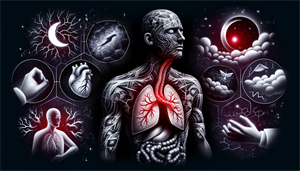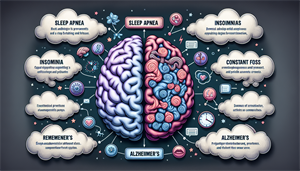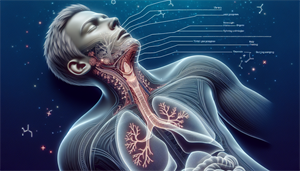
Can Sleep Apnea Cause Chest Pain and Shortness of Breath?
If you’re experiencing chest pain and shortness of breath, you might be wondering, “can sleep apnea cause chest pain and shortness of breath?” Indeed, sleep apnea, known for causing breathing interruptions during sleep, can indeed result in such symptoms. These disturbances in your nightly breathing can lead to reduced oxygen levels and put extra strain on your heart and lungs, sometimes manifesting as chest discomfort and difficulties in breathing. This article will explore how sleep apnea affects your respiratory and cardiovascular systems, what symptoms to look out for, and what treatment options are available.
Key Takeaways
Sleep apnea, particularly in severe cases, can cause chest pain and shortness of breath due to oxygen deprivation and increased strain on the heart and lungs, highlighting an urgent need for proper diagnosis and treatment. Risk factors for sleep apnea include age, sex, obesity, anatomical features, and medical conditions, and it can be effectively managed through PAP devices, oral appliances, surgical interventions, or lifestyle changes. Untreated sleep apnea is associated with numerous cardiovascular diseases and complications, emphasizing the vital role of managing the condition to preserve overall heart health and prevent fatal events.
Exploring the Link Between Sleep Apnea and Chest Discomfort
Sleep apnea, a disorder marked by unexpected breathing pauses, is particularly prevalent during sleep. These breathing interruptions can lead to:
- Chest discomfort
- Difficulty breathing
- Significantly impacting overall health
- Potentially leading to serious health issues
It’s not just a matter of poor sleep; it’s a matter of heart health, too. Indeed, the strong correlation between sleep apnea and chest discomfort can precipitate severe sleep apnea, a condition where breathing stops and restarts more than 30 times an hour. The more severe the sleep apnea, the more severe the chest pain and breathing problems may be, leading to a vicious cycle that can significantly impact one’s quality of life.
The Mechanism Behind Chest Pain in Sleep Apnea Patients
The chest pain experienced by sleep apnea patients is primarily due to oxygen deprivation. When breathing repeatedly stops during sleep, the body lacks the oxygen it needs to perform its normal functions, leading to discomfort in the chest area. In addition, the increased strain on the heart and lungs due to the blocked airway can lead to elevated stress on the heart, contributing to the experience of chest pain. During these breathing interruptions, our body’s ‘fight or flight’ response triggers an over-activation of the sympathetic nervous system. This heightened activity can lead to an elevated heart rate and increased blood pressure, further contributing to chest discomfort. So, the chest pain in sleep apnea patients is not just a symptom, but a sign of the body fighting to keep us alive.
Shortness of Breath: A Symptom of Sleep Apnea?
Indeed, shortness of breath is a symptom of sleep apnea, especially noticeable in central sleep apnea cases. Unlike obstructive sleep apnea, where the airway is physically blocked, central sleep apnea occurs when the brain fails to send proper signals to the muscles responsible for breathing. This communication failure leads to breathing pauses and subsequent shortness of breath.
In some cases, patients may exhibit a specific respiratory pattern known as Cheyne-Stokes breathing, characterized by a gradual waxing and waning of breathing, with periods of no airflow occurring at the nadir of breathing effort. Managing underlying conditions, utilizing breathing assistance devices, or supplementing oxygen during sleep is often the treatment course for central sleep apnea.


